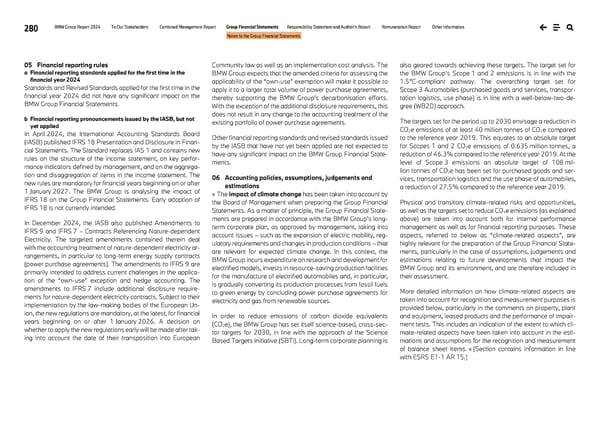280 BMW Group Report 2024 To Our Stakeholders Combined Management Report Group Financial Statements Responsibility Statement and Auditor’s Report Remuneration Report Other Information Notes to the Group Financial Statements 05 Financial reporting rules a Financial reporting standards applied for the first time in the financial year 2024 Standards and Revised Standards applied for the first time in the financial year 2024 did not have any significant impact on the BMW Group Financial Statements. b Financial reporting pronouncements issued by the IASB, but not yet applied In April 2024, the International Accounting Standards Board (IASB) published IFRS 18 Presentation and Disclosure in Finan- cial Statements. The Standard replaces IAS 1 and contains new rules on the structure of the income statement, on key perfor- mance indicators defined by management, and on the aggrega- tion and disaggregation of items in the income statement. The new rules are mandatory for financial years beginning on or after 1 January 2027. The BMW Group is analysing the impact of IFRS 18 on the Group Financial Statements. Early adoption of IFRS 18 is not currently intended. In December 2024, the IASB also published Amendments to IFRS 9 and IFRS 7 – Contracts Referencing Nature-dependent Electricity. The targeted amendments contained therein deal with the accounting treatment of nature-dependent electricity ar- rangements, in particular to long-term energy supply contracts (power purchase agreements). The amendments to IFRS 9 are primarily intended to address current challenges in the applica- tion of the “own-use” exception and hedge accounting. The amendments to IFRS 7 include additional disclosure require- ments for nature-dependent electricity contracts. Subject to their implementation by the law-making bodies of the European Un- ion, the new regulations are mandatory, at the latest, for financial years beginning on or after 1 January 2026. A decision on whether to apply the new regulations early will be made after tak- ing into account the date of their transposition into European Community law as well as an implementation cost analysis. The BMW Group expects that the amended criteria for assessing the applicability of the “own-use” exemption will make it possible to apply it to a larger total volume of power purchase agreements, thereby supporting the BMW Group's decarbonisation efforts. With the exception of the additional disclosure requirements, this does not result in any change to the accounting treatment of the existing portfolio of power purchase agreements. Other financial reporting standards and revised standards issued by the IASB that have not yet been applied are not expected to have any significant impact on the BMW Group Financial State- ments. 06 Accounting policies, assumptions, judgements and estimations » The impact of climate change has been taken into account by the Board of Management when preparing the Group Financial Statements. As a matter of principle, the Group Financial State- ments are prepared in accordance with the BMW Group's long- term corporate plan, as approved by management, taking into account issues – such as the expansion of electric mobility, reg- ulatory requirements and changes in production conditions – that are relevant for expected climate change. In this context, the BMW Group incurs expenditure on research and development for electrified models, invests in resource-saving production facilities for the manufacture of electrified automobiles and, in particular, is gradually converting its production processes from fossil fuels to green energy by concluding power purchase agreements for electricity and gas from renewable sources. In order to reduce emissions of carbon dioxide equivalents (CO2e), the BMW Group has set itself science-based, cross-sec- tor targets for 2030, in line with the approach of the Science Based Targets initiative (SBTi). Long-term corporate planning is also geared towards achieving these targets. The target set for the BMW Group’s Scope 1 and 2 emissions is in line with the 1.5°C-compliant pathway. The overarching target set for Scope 3 Automobiles (purchased goods and services, transpor- tation logistics, use phase) is in line with a well-below-two-de- gree (WB2D) approach. The targets set for the period up to 2030 envisage a reduction in CO2e emissions of at least 40 million tonnes of CO2e compared to the reference year 2019. This equates to an absolute target for Scopes 1 and 2 CO2e emissions of 0.635 million tonnes, a reduction of 46.3% compared to the reference year 2019. At the level of Scope 3 emissions an absolute target of 108 mil- lion tonnes of CO2e has been set for purchased goods and ser- vices, transportation logistics and the use phase of automobiles, a reduction of 27.5% compared to the reference year 2019. Physical and transitory climate-related risks and opportunities, as well as the targets set to reduce CO2e emissions (as explained above) are taken into account both for internal performance management as well as for financial reporting purposes. These aspects, referred to below as “climate-related aspects”, are highly relevant for the preparation of the Group Financial State- ments, particularly in the case of assumptions, judgements and estimations relating to future developments that impact the BMW Group and its environment, and are therefore included in their assessment. More detailed information on how climate-related aspects are taken into account for recognition and measurement purposes is provided below, particularly in the comments on property, plant and equipment, leased products and the performance of impair- ment tests. This includes an indication of the extent to which cli- mate-related aspects have been taken into account in the esti- mations and assumptions for the recognition and measurement of balance sheet items. « (Section contains information in line with ESRS E1-1 AR 15.)
 BMW Group Report 2024 Page 279 Page 281
BMW Group Report 2024 Page 279 Page 281